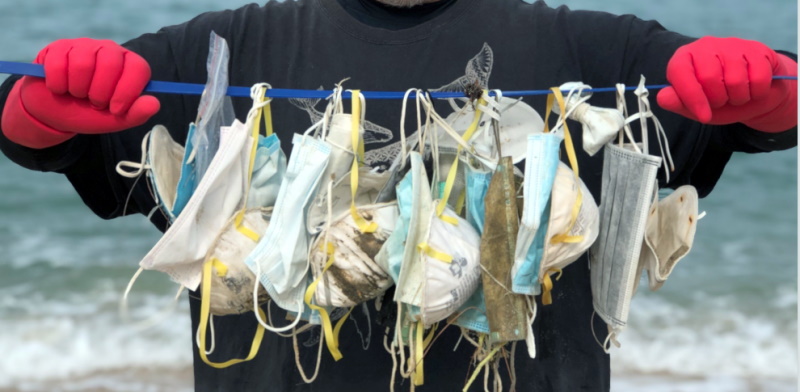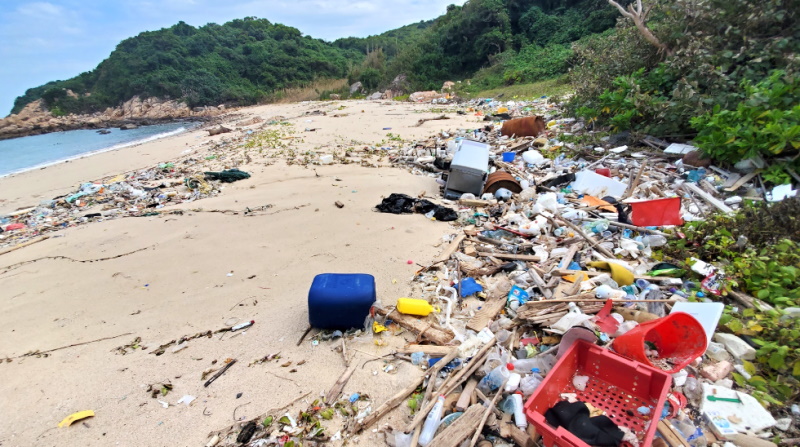The marine research group Oceans Asia has released a report titled, Masks on the Beach: The Impact of COVID-19 on Marine Plastic Pollution. The article outlines important issues regarding the global impact of PPE face masks as a source of pollution globally.
Single-use face masks are made from a variety of meltblown plastics and are difficult to recycle due to both composition and risk of contamination and infection. These masks enter our oceans when they are littered or otherwise improperly discarded, when waste management systems are inadequate or non-existent, or when these systems become overwhelmed due to increased volumes of waste.
“Using an annual global production estimate of 52 billion masks, we calculate that1.56 billion maskswill enter our oceans in 2020, amounting to between 4,680 and 6,240 tonnes of plastic pollution.”
Around the world, as a result of the COVID-19 pandemic, the production and use of personal protective equipment (PPE), such asmasks and gloves,has skyrocketed. The value of the global face masks market was~$0.79 billion USD in 2019, but expanded to an estimated~$166 billion USD by the end of 2020.
One report in June predicted that the volume of this market will peak at more than 52 billion units by the end of 2020.This rapid increase in production still falls short of demand –in June the World Health Organization (WHO) and others estimated that 129 billion face masks and 65 billion gloves would be needed on a monthly basis in order to protect people worldwide.
Regardless of whether the face mask offers adequate protection from a virus which is smaller than the majorty of masks are capable of filtering, PPE face masks are currently in use around the world as a means of personal protection from Sars Covid-19 and other pathogens. One issue that is rarely discussed is what happens to these disposable masks once they are discarded.
If they truely function as intended then they should be disposed of as a harzardous waste product, since they could contain virus particles, bacteria, molds or fungus.
If disposed of properly they still end up in landfills, and add to the accumulation of plastics in the environment.
The improper disposal of single-use plastic PPE has led to a surge in plastic pollution, most notably in our oceans and waterways. This increase was brought to world attention when we first reported finding face masks washing up on remote beaches in the Soko Islands, Hong Kong in late February 2020. Since then, with each visit, we have continued to find masks on beaches around Hong Kong.
Unfortunately, this problem is not limited to Hong Kong; divers with Opération Mer Propre found masks on the sea bed during a clean up near the Côte d'Azur, France.
Photographer, Dan Giannopoulos photographed over 300 discarded gloves and masks found around Southampton, United Kingdom (UK) over the course of 4 days.
The news is full of stories of PPE littering cities around the globe.
The proliferation of masks in the environment reveals weaknesses in our waste management systems and irresponsible practices/habits on the part of individuals.
It also serves to illuminate an issue that has been accumulating for decades–unchecked plastic pollution contaminating our environment. The accumulation of plastic in the environment is not a recent phenomenon, but it is one that is becoming increasingly problematic and unavoidable – encountering plastic debris on a visit to the beach is almost inescapable.
Here on Playa Potrero, Canadian visitors helping with a beach cleanup in December, were shocked to find dozens of discarded plastic hypodermic needles washed up on the beach. Other plastics containers and discarded items are a constant source of concern. It's inevitable that discarded masks will soon become a new source of waste washing up on our shores.
The research indicates additional plastic pollution created by the COVID-19 pandemic is but part of a much larger problem. While this problem is not new, the urgency of the call to action grows louder as the plastic piles up.
You can view or download the research document here.
To support the work of Oceans Asia or get involved by sponsoring a project visit here











